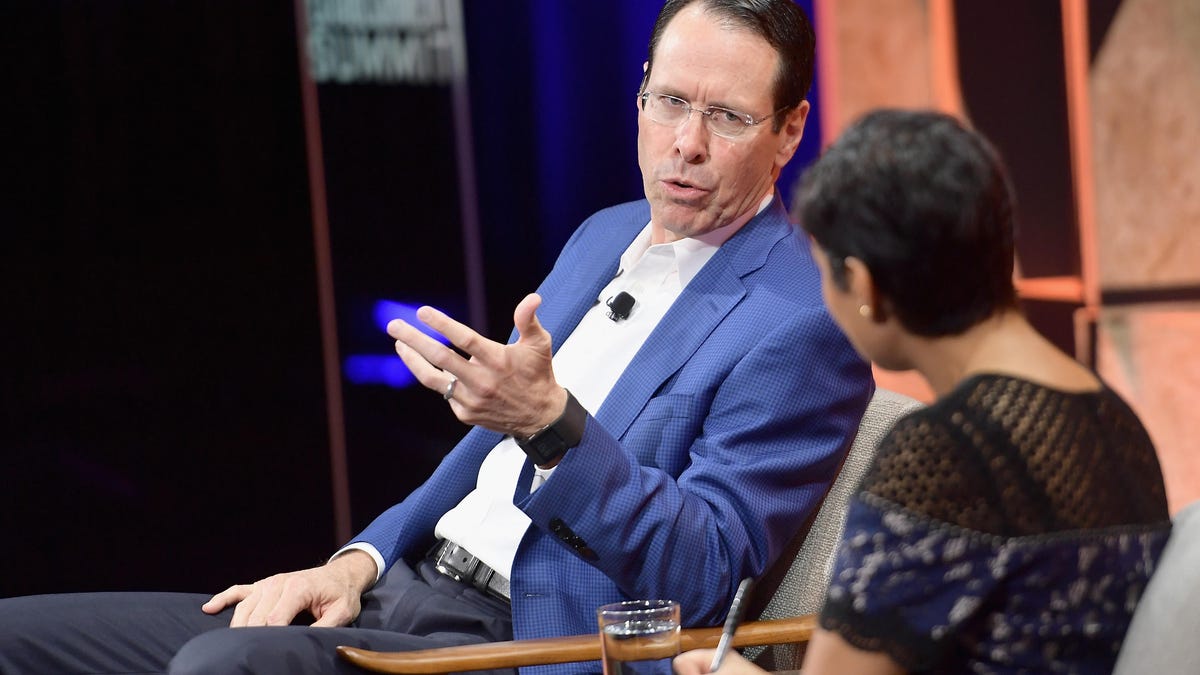AT&T CEO makes the case for acquiring Time Warner
Randall Stephenson says his wireless carrier will use targeted advertising to change the TV market and lower prices for consumers.

AT&T CEO Randall Stephenson and Vanity Fair Deputy Editor Stephanie Mehta speak onstage Wednesday at a summit in Beverly Hills, California.
The biggest benefit of AT&T's $85 billion acquisition of Time Warner? Cheaper prices for consumers, fueled mostly by more targeted advertising.
That's what AT&T CEO Randall Stephenson said Wednesday at the Vanity Fair New Establishment Summit in Beverly Hills.
Stephenson said not many people can afford the $110 to $120 a month cable companies charge for their traditional TV bundle. That's why so many people are "cutting the cord" and are instead subscribing to streaming services like AT&T's DirecTV Now, which allows people to watch their favorite shows via the internet at home on their big screen TVs or on the go on their mobile devices.
Stephenson said AT&T's acquisition of DirecTV was the first step in getting costs down. AT&T's DirecTV Now (when bundled with AT&T) starts as low as $10 a month for 60 channels of live TV. And the company has already begun adding free access to HBO for its unlimited wireless customers.
The addition of content from Time Warner will drive down costs even further.
"Does the customer get a better deal?" he asked. "The answer is yes."
Stephenson's comments come as stiff competition erodes the company's core wireless business. Smaller rivals Sprint and T-Mobile have been scooping up AT&T's subscribers. It's the same trend that has forced Verizon to make its own acquisitions, although Verizon's bets, like those in AOL and Yahoo, have been relatively smaller ones.
AT&T last year announced its plans to buy media conglomerate Time Warner. Stephenson said he expects the merger to close by the end of the year. He also said he doesn't think President Donald Trump's criticisms of Time Warner's CNN news network is a factor that could potentially kill the deal. Trump has repeatedly called CNN "fake news" and said when he was candidate that he would try to block the deal.
"I don't know what the relevance of CNN is with an antitrust review," Stephenson said.
How can AT&T afford to give away content and offer bundles at such low prices? While there are efficiencies to be gained from owning both the distribution and the content, the real answer is all about better targeted advertising.
"If you're advertising in the premium video world, you now know where your brand is showing up," Stephenson said. "We think we have a real opportunity here to change the advertising game."
None of this is rocket science, Stephenson said. And AT&T is just one of several companies trying to capitalize on the ability to better target consumers. He said that this new business means the wireless carrier will also be competing with the likes of Amazon.
"I think we're all running very similar plays, just from a different perspective," he said.
He also addressed concerns that AT&T is paying people to give up their privacy in exchange for a lower cost service. He said AT&T has experimented with so-called opt-in policies and that customers have responded favorably to them
"Customer privacy is very, very important," he said. "But there is a price they're willing to pay to share [their information.]"
The Smartest Stuff: Innovators are thinking up new ways to make you, and the things around you, smarter.
iHate: CNET looks at how intolerance is taking over the internet.



